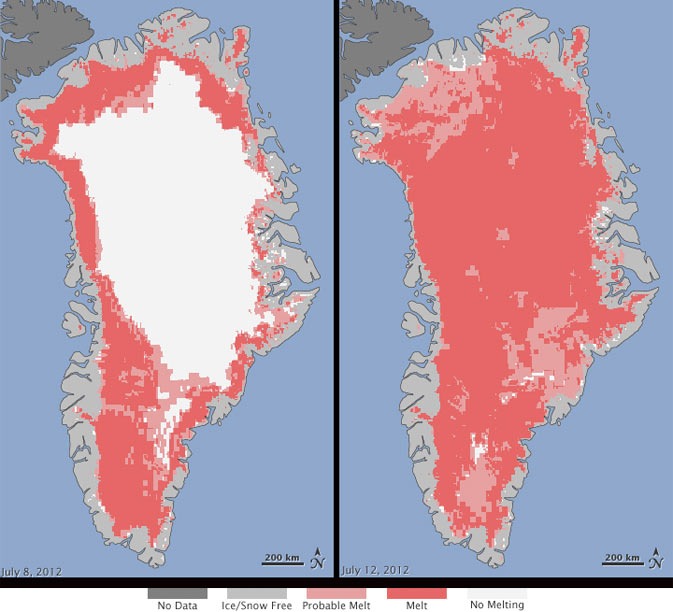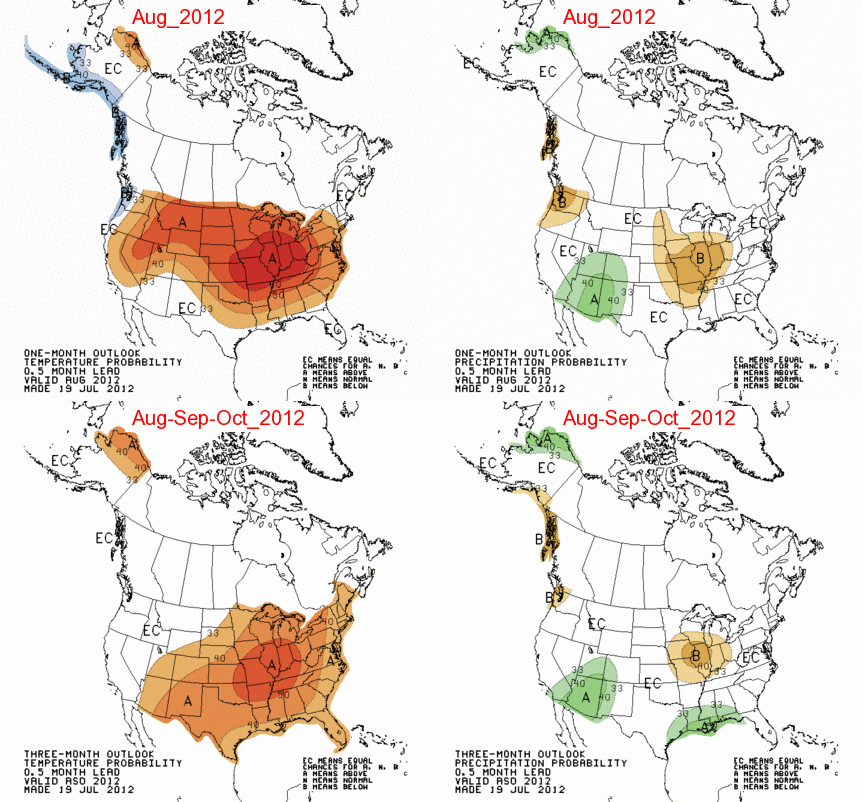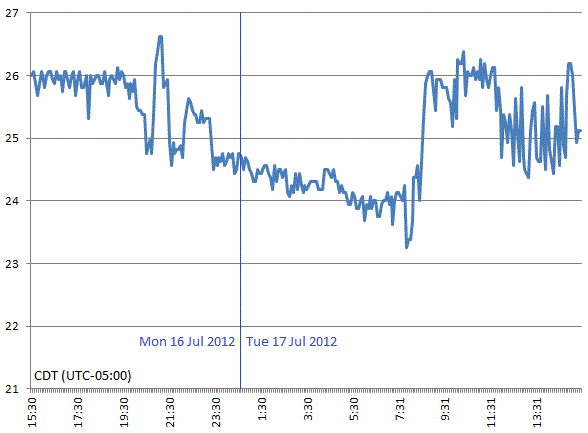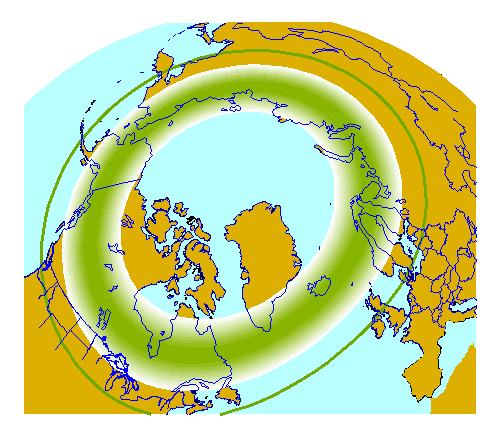Chicago today looks set to get up to 39°C, part of an emerging pattern of worsening heat waves in the region.
The holy terror this summer, however, is 2,000 km to the northeast. Greenland has experienced unprecedented thawing this month:

The set of images released by NASA on Tuesday show a rapid thaw between 8 July and 12 July. Within that four-day period, measurements from three satellites showed a swift expansion of the area of melting ice, from about 40% of the ice sheet surface to 97%.
About half of Greenland's surface ice sheet melts during a typical summer, but [Jay Zwally, a glaciologist at NASA's Goddard Space Flight Center] said he and other scientists had been recording an acceleration of that melting process over the last few decades. This year his team had to rebuild their camp, at Swiss Station, when the snow and ice supports melted.
He said he was most surprised to see indications in the images of melting even around the area of Summit Station, which is about two miles above sea level.
It was the second unusual event in Greenland in a matter of days, after an iceberg the size of Manhattan broke off from the Petermann Glacier. But the rapid melt was viewed as more serious.
Greenland's ice sheet accounts for possibly 25% of the world's fresh water. A massive release of that water into the North Atlantic would not only raise sea levels worldwide, but also could distrupt thermohaline circulation, which in turn would make northern Europe's weather more like Canada's.
Of course, we'll all forget this in the winter, and react with surprise and alarm in a year or two when we have another record-breaking summer. Time to adapt.
After seven days above 32°C in a row, Thursday gave us a humid, rainy 28°C before yesterday's perfect, dry 27°C. We've had a record 32 days above 32°C since June 1st, six more than we had by this time in the previous-hottest summer I remember, 1988.
The forecast for the next few days looks grim: 32°C today, 34°C Sunday, and 39°C Monday.
Welcome to the new normal: in just a couple of years, Chicago has gone from hard winters and mild summers to mild winters and broiling summers. And the climate is still changing...
I'm a little late getting the semi-annual
Chicago sunrise chart out this summer. Sorry.
(You can get one for your own location at
http://www.wx-now.com/Sunrise/SunriseChart.aspx.)
|
Date
|
Significance
|
Sunrise
|
Sunset
|
Daylight
|
|
2012
|
|
2 Jul
|
8:30pm sunset
|
05:20
|
20:30
|
15:09
|
|
16 Jul
|
5:30am sunrise
|
05:30
|
20:24
|
14:53
|
|
8 Aug
|
8pm sunset
|
05:53
|
20:00
|
14:06
|
|
16 Aug
|
6am sunrise
|
06:00
|
19:48
|
13:48
|
|
28 Aug
|
7:30pm sunset
|
06:13
|
19:30
|
13:16
|
|
13 Sep
|
6:30am sunrise
|
06:30
|
19:03
|
12:33
|
|
15 Sep
|
7pm sunset
|
06:33
|
19:00
|
12:28
|
|
22 Sep
|
Equinox,
09:49 CDT
|
06:39
|
18:48
|
12:08
|
|
25 Sep
|
12-hour day
|
06:42
|
18:42
|
12:00
|
|
2 Oct
|
6:30pm sunset
|
06:50
|
18:30
|
11:40
|
|
13 Oct
|
7am sunrise
|
07:01
|
18:13
|
11:10
|
|
21 Oct
|
6pm sunset
|
07:11
|
18:00
|
10:48
|
|
3 Nov
|
Latest sunrise until 2 Nov 2013
Latest sunset until Mar 2nd
|
07:27
|
17:42
|
10:15
|
|
4 Nov
|
Standard time returns
Earliest sunrise until Feb 28th
|
06:28
|
16:41
|
10:13
|
|
6 Nov
|
6:30 sunrise
|
06:30
|
16:39
|
10:08
|
|
15 Nov
|
4:30pm sunset
|
06:41
|
16:30
|
9:49
|
|
1 Dec
|
7am sunrise
|
07:00
|
16:21
|
9:21
|
|
7 Dec
|
Earliest sunset of the year
|
07:06
|
16:20
|
9:14
|
|
21 Dec
|
Solstice,
05:12 CST
|
07:16
|
16:23
|
9:07
|
|
2013
|
|
3 Jan
|
Latest sunrise until Oct 28th
|
07:19
|
16:33
|
9:13
|
|
27 Jan
|
5pm sunset
|
07:08
|
17:00
|
9:52
|
|
4 Feb
|
7am sunrise
|
07:00
|
17:10
|
10:10
|
|
20 Feb
|
5:30pm sunset
|
06:39
|
17:31
|
10:52
|
|
26 Feb
|
6:30am sunrise
|
06:30
|
17:38
|
11:08
|
|
9 Mar
|
Earliest sunrise until Apr. 14th
Earliest sunset until Oct. 28th
|
06:12
|
17:51
|
11:38
|
|
10 Mar
|
Daylight savings time begins
Latest sunrise until Oct. 22nd
Earliest sunset until Sept. 20th
|
07:11
|
18:52
|
11:41
|
|
17 Mar
|
7am sunrise, 7pm sunset
12-hour day
|
06:59
|
19:00
|
12:01
|
|
20 Mar
|
Equinox
06:02 CDT
|
06:54
|
19:04
|
12:10
|
|
3 Apr
|
6:30am sunrise (again)
|
06:30
|
19:19
|
12:49
|
|
13 Apr
|
7:30pm sunset
|
06:13
|
19:30
|
13:16
|
|
22 Apr
|
6am sunrise
|
06:00
|
19:39
|
13:39
|
|
10 May
|
8pm sunset
|
05:36
|
20:00
|
14:24
|
|
15 May
|
5:30am sunrise
|
05:30
|
20:05
|
14:36
|
|
14 Jun
|
Earliest sunrise of the year
|
05:15
|
20:28
|
15:12
|
|
21 Jun
|
Solstice
00:04 CDT
8:30pm sunset
|
05:16
|
20:30
|
15:14
|
|
26 Jun
|
Latest sunset of the year
|
05:17
|
20:31
|
15:13
|
You can get sunrise information
for your location at wx-now.com.
Via Illinois State Climatologist Jim Angel, the Climate Prediction Center has new 1- and 3-month outlooks for the continent. Chicago has a 60% chance of being hotter and a 30% chance of being drier than normal through the end of August:

This is already a hotter summer than 1988, and on its way to become one of the hottest summers in recorded history. Oh, joy.
Even though the temperature outside tied the record 38°C set 70 years ago, I'm happy to report that Inner Drive Technology World Headquarters has remained tolerably cool:

Those are degrees Celsius vertically and the last 24 hours of time horizontally. The lower temperatures overnight come from me turning the air conditioning to a cooler setting in the evening and back up in the morning.
What you can't see in this snapshot is that during our last hot, hot summer (2008), I had trouble keeping the office below 27.5°C. That's where the server fans spin up, power consumption skyrockets, and the electronics within the servers start crying. So far in the last two months, I've only had about three hours total above that threshold temperature, caused not by inadequate air conditioning but by me not closing the windows and turning the AC on in the first place.
I credit the window replacement completed in December 2010. Since 2011 had neither a particularly harsh summer nor a harsh winter, it was harder to see this data before.
Also, having turned off 40% of my servers probably helped.
Still, I do not want to go outside right now...
Today marks the 31st time this year Chicago's temperature has exceeded 32°C as another record falls:
The July 17 record high of 38°C for this date has stood 70 years, having been set in 1942 during World War II. Tuesday's heat gives the city a shot at replacing this record. [It was 36°C just before noon.—DB]
New USDA crop report paints bleak picture across much of the Midwest; more than half of Illinois' corn crop is "poor" or "very poor"!
Crops are struggling in many Midwest fields this year. USDA's weekly report on crop conditions released Monday indicates the condition of the corn crop continues to deteriorate. 56 percent of corn in Illinois is rated "poor"or "very poor". That percentage stands at 43 percent in Wisconsin; 27 percent in Iowa; 56 percent in Michigan; and grows to 69 percent in Missouri; and a whopping 71% in Indiana.
The New Yorker's Elizabeth Kolbert points out we made this happen 30 years ago:
One of the most salient—but also, unfortunately, most counterintuitive—aspects of global warming is that it operates on what amounts to a time delay. Behind this summer’s heat are greenhouse gases emitted decades ago. Before many effects of today’s emissions are felt, it will be time for the Summer Olympics of 2048. (Scientists refer to this as the “commitment to warming.”) What’s at stake is where things go from there. It is quite possible that by the end of the century we could, without even really trying, engineer the return of the sort of climate that hasn’t been seen on earth since the Eocene, some fifty million years ago.
Along with the heat and the drought and the super derecho, the country this summer is also enduring a Presidential campaign. So far, the words “climate change” have barely been uttered. This is not an oversight. Both President Obama and Mitt Romney have chosen to remain silent on the issue, presumably because they see it as just too big a bummer.
And so, while farmers wait for rain and this season’s corn crop withers on the stalk, the familiar disconnect continues. There’s no discussion of what could be done to avert the worst effects of climate change, even as the insanity of doing nothing becomes increasingly obvious.
Welcome to the 21st Century.
As Chicago temperatures today and tomorrow will likely hit 35°C, I find myself looking forward to October. While temperatures will undoubtedly be lower then, we may not actually have a very interesting leaf season:
Deciduous trees (trees that lose their foliage in the winter) are sensitive to the increasing length of night during the autumn. When the hours of darkness reach a threshold value, fall colors begin to appear. The U.S. National Arboretum says, "Because the starting time of the whole process is dependent on night length, fall colors appear at about the same time each year in a given location, regardless whether temperatures are cooler or warmer than normal." However, drought stress during the growing season can cause leaves to fall before they have a chance to develop fall coloration, and that will be the likely effect of our drought: bland fall colors.
The one, single benefit related to all this heat and drought: we're having the third-sunniest July in history.
The aurora borealis could be visible as far south as Chicago, Belfast, and Seattle tonight and tomorrow:

A significant event located on the Sun facing Earth took place on July 12. The effects of this event will begin to reach Earth early on the 14th of July GMT.
Observers in North America should watch for aurora on the nights of the 14th and 15th local time. Depending on the configuration of the disturbance, auroras may be visible as far south as the middle tier of states.
Activity may remain high also on the 16th. Auroras should be visible Southern New Zealand, Tasmania, and of course, Antarctica.
I've only seen aurorae from airplanes in flight over the polar regions. Obviously they're invisible from within the city of Chicago, but if I had a boat, tonight would be great for going out on the lake and looking for them.
Even though Chicago has had completely tolerable weather the last three days, June and the first few days of July took their toll. Since the beginning of meterological summer on June 1st, Chicago has had the hottest summer ever, with only 26% of normal rainfall:
Its 24.7°C average temperatures is running 3.8°C above the long term (142-year) average and 2.9°C above the same period a year ago. Wednesday is to bring the metro area's 14th consecutive day of above normal temperatures.
July's abundant sunshine has month on track to end up one of the area's three or four sunniest.
It's not surprising at all to learn that not only is the summer season is the warmest on the books, it also ranks among the three or four sunniest Julys on record here with 86 percent of the area's possible sun--well above the 68 percent considered normal.
It's just over 30°C now, and forecast to hit 32°C at the lakefront by Saturday (and today, inland).
Brief respite over, I suppose. I even had the windows open the last couple of mornings.
It's pretty warm in New York right now: 33°C. That's cooler than 38°C, the current official temperature in Chicago, making it the third day in a row that Chicago has gotten that hot:
July's opening 5 days the hottest in 101 years
The month is young—just 5 days old. Yet it's 30.2°C average temperature is 7.3°C above normal and makes it the warmest July open since 1911 when the period averaged 31°C.
Apparently relief is coming with temperatures predicted to fall into the mid-20s (mid-70s Fahrenheit) Sunday.
Despite being in New York, I've actually spent the morning and part of the afternoon completing a project for work. I'm done now, giving me just enough time to run an errand before tonight's Cubs game at Citi Field. Look for photos from the game tomorrow afternoon.